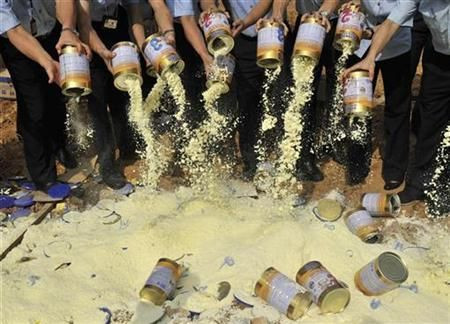Why Are The Chinese Coveting Black-Market Powdered Milk?

Border officials often deal with cracking down on the illegal transfer of various goods. In Hong Kong, more people are arrested for smuggling milk formula than heroin.
Beginning March 1, the special administrative region in China restricted all outbound travelers from bringing any more than two, 2-pound cans of milk formula powder after several product-safety scandals involving domestically made milk in mainland China. At least six babies died as a consequence of tainted milk.
The milk powder scare on the mainland has many relying on Hong Kong’s more readily available supplies of foreign brand milk formula. The U.K. and New Zealand also enacted their own restrictions on bulk purchases of milk after they saw local shortages.
Milk powder has become such a coveted commodity in China that officials in Hong Kong have detained the members of a milk powder criminal syndicate, surpassing the amount of people arrested for the entirety of last year for carrying heroin.
Now, according to Bloomberg, international brands are able to leverage their sought-after milk formula products to further infiltrate the China market, which yields roughly $15.4 billion a year, four times the size of the U.S. market. Domestic brands, which have been riddled with food-safety issues, will undoubtedly suffer. At the height of the baby formula scare in 2008, 22 companies were found to have sold dairy products containing the toxic chemical melamine, which is used to make milk appear to have higher protein content.
With the crackdown at the borders, now mainland mothers are turning to online resources. Bloomberg spoke to Liu Ying, who lives overseas in Germany and operates a shop on Taobao.com, a popular e-commerce site, which sells foreign milk powder.
“It’s become very difficult to buy infant formula at the stores since last November,” the mother of one said.
Some places limit her to only purchasing one can, sometimes even asking her to prove she has a child. As a result, she says she has stopped taking orders for overseas shipments of milk formula, reserving her resources for close friends and relatives.
Other shops on Taobao still sell the items at inflated prices, running at around 220 yuan, or more than $32 per can, excluding shipping fees, and often have long waiting periods. One store had a back-order waiting period of almost two months.
Those who aren’t willing to wait have broadened their search for safe dairy products to local stores that carry international brands for a niche market.
Yuri Valazza opened a small imported food store in Shanghai eight years ago, and his clientele was mostly foreigners. Now, he says that has changed.
“We see a lot of fresh milk being bought a lot by [Chinese customers], yogurt, especially, anything that children tend to eat, baby foods,” Valazza said in a report by American Public Media, a nonprofit organization that produces Marketplace.
Chinese consumers are unlikely to begin trusting domestic brands again soon as overseas brands continue to export safer, strictly regulated items to China.
George Siemon, CEO of Organic Valley, based in La Farge, Wis., started exporting milk to China three years ago and sees his brand flourishing there, because it's perceived as trustworthy.
“You also have the USDA seal of quality control [in addition to being organic],” Siemon told Marketplace. “So it really is a double premium that we’re able to offer people.”
Chinese trust in the brand translates to multi-million dollar revenue for Organic Valley. The company projects that its future earnings will increase from about $4 million a year in China today, to $100 million in five years.
© Copyright IBTimes 2024. All rights reserved.






















